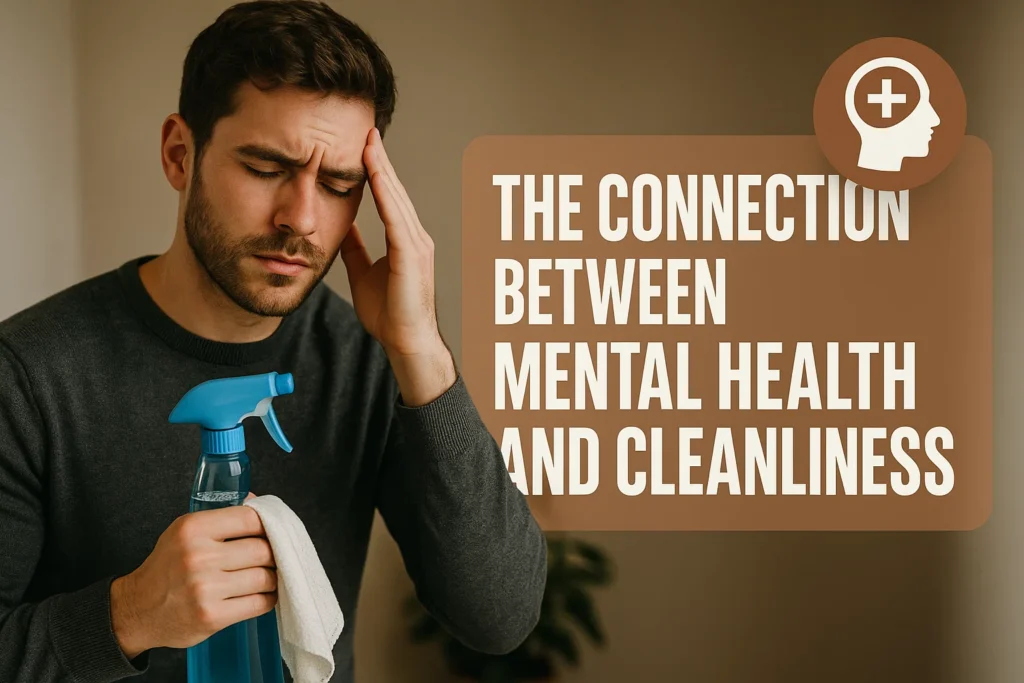Keeping your living area clean and tidy is considered to be a fundamental aspect of everyday life, however, did you know that it can significantly improve your mental health? Surroundings of your home or even the workplace may condition your mood, thoughts, and even performance. Alleviating stress, enhancing concentration, and making you a more organized person are all issues that cleanliness can help you with, much more than aesthetics.
In this article, we are going to find out how clean influences mental health, the secret connection between cluttering and depression, and how decluttering can be the stress reliever you never knew you wanted. Besides, you will obtain some valuable hints on how to do it mindfully and how some mental disorders may influence your cleaning routine. Ready to transform your environment and mind? Let’s dive in.
How Cleanliness Affects Mental Health and Well-being
Cleaning is far more than just pride or impressing the visitors but it is closely linked to how you feel in yourself. There are a number of studies that reveal individuals who practice an organised environment report feelings of lesser stress and more feelings of happiness and calmness.
Less Stress: Cluttered spaces clog the brain signaling the brain in a constant state of disarray or unfinished business.
Increased Concentration: Cleaning helps one think straight instead of distracting thoughts; one of the benefits is that one can keep a clear mind to focus or even enjoy leisure time.
Improved Sleeping: Dirty bedrooms have also been shown to cause insomnia because of the stimulation of stress during sleep. Clean bedrooms encourage sleep, fall and sleep deeper.
High Self-Esteem: Being able to control your surroundings will give you a feeling of accomplishment and self worth.
Having a clean environment will help you build a peaceful refuge that will aid in maintaining your mental peace and stability.
The Link Between Messy Spaces and Depression

Internal states of confusion, sadness, and overwhelm are often accompanied by anything messy in the area. Studies have revealed that cluttered homes have a close relationship with incidences of depression.
Emotional Overload: Disorderly environments may contribute to a sense of hopelessness and being overwhelmed, and additional difficulty handling day to day problems.
Social Isolation: Individuals can become lonely and would not invite friends or relatives to visit, which will aggravate the symptoms of depression.
Procrastination and Guilt: Persistence of mess can make it seem that a task is impossible to accomplish, hence leading to procrastination and therefore, resulting in the feeling of guilt and more stressful conditions.
Decreased Motivation: Depression can leave a person feeling like they lack the vitality to clean and the lack of motivation may feed off the energy necessary to clean.
It is important to identify this relationship as it will help seek help concerning not only their mental health but also space.
Why Decluttering Can Help Alleviate Stress and Anxiety
Decluttering is not just about clean ups. It is a healing process which helps to overcome mental pressure, stress and anxiety imposed on you.
Sense of Control: You feel out of control in a chaotic life so getting rid of extra stuff and reorganizing your surroundings gives you a direct means of getting back in control.
Clear Thinking: When you have less to compete with in the mind, you have less to worry about and your mind can think clearly.
Improved Peace of Mind: Clutter can create a restless mind so getting rid of clutter can create a peaceful mind.
Boosted Productive: Cleared areas can enhance concentration and a sense of accomplishment, as well as make you more productive, cutting down on anxiety over unfinished projects.
Even minor decluttering tasks, such as cleaning out a desk drawer or organizing a bookshelf can jumpstart major changes in your mental health.
Is a Messy House Contributing to Your Mental Clutter?
Mental clutter is defined as the ongoing procession of thoughts, concerns and distractions that can puzzle your mind. As you can imagine and whether you believe it or not, clutter around you can contribute to this mental clatter.
Consistently Reminded: A mess is a consistent reminder of whatever is not achieved and what has not been finished.
Visual Overload: It is difficult to rest or pay attention because there are too many stimuli present in your surroundings.
Reduced Creativity: Creativity can be killed by clutter in your environment.
Emotional Energy: The very sight of disorder every day can dampen your emotional energy and deprive you of enjoying other positive things in life.
Physical clutter can also be eliminated by getting organized about cleaning it up; this can provide you with more room to think.
Tips for Mindful Cleaning
Cleaning does not need to be merely a tedious task, but a stress relieving practice that will do wonders to your home and your psyche. These are some of the tips to turn cleaning into a stress reliever:
Set Small Goals: Cleaning your house should be broken down into small manageable tasks so that you do not feel overwhelmed. As an example, clean one shelf or one room at a time.
Engage Deep Breathing: Breathe deeply before you begin, to connect yourself in the present.
Use the full effect of your senses: smell the cleaning products, feel the clothes, hear the sweeping–this will bring you to the physical.
Get Ready to Clean: De-clutter, remove any unnecessary objects prior to cleaning surfaces to enable your focus on cleaning.
Play some Music or a Podcast: The background sound will make the time fly.
Recognize Progress: Achievement to a greater or lesser extent should be rewarded to boost motivation and mood.
Mindful cleaning is a simple activity that converts into a meditative practice that helps to bring peace of mind.
How Mental Health Disorders like OCD Can Affect Your Cleaning Habits

Such cleaning behavior can be influenced really heavily by mental health disorders like Obsessive-Compulsive Disorder (OCD) and it can be difficult to know when to stop.
Obsessive-Compulsive cleaning: OCD may lead to Obsessive-Compulsive cleaning and handwashing because one feels anxious about germs or pollution.
Perfectionism: The affinity to order and symmetry may involve the repetitive cleaning or organizing to the extent of non-practicality.
Emotional Distress: Emotional distress comes in terms of guilt or disgust where the rituals of cleaning are unable to be carried out.
Impaired Functioning: Function of cleaning might take too much time, which impairs normal life, relationship and work.
When you or a loved one has an issue with compulsive cleaning tendencies, the help of professional mental health treatment is essential. The initial step to leading a life in balance is to know the difference between healthy tidying and OCD-related tidying behavior.
The Impact of a Clean Home on Your Mood and Productivity
The effects of a clean home are straightaway reflected on your personal mood and productivity levels on a daily basis.
Mood Booster: Having a clean, fresh-smelling environment brings out a desire of satisfaction and calmness when walking into one.
Increased Creativity: A clean office will invite brainstorming and brainstorming.
The power to Act: One will be less distracted and thus can focus to start working on things without procrastination.
Improved Time Management: With everything in place, less time is wasted searching for items or getting overwhelmed by mess.
Be it at the workplace or at home, hygiene gives you the confidence to be the most excellent version of yourself daily.
Conclusion
There’s a powerful two-way connection between mental health and cleanliness. Clean and orderly surroundings can help relieve stress, enhance mood, and concentration and disorder and clutter tend to cause anxiety, depression, mental exhaustion. Due to knowing this connection, you can learn to develop a healthy home environment based on the following mindful cleaning practices.
It may be too much of a burden to complete the cleaning or sorting operation on your own so get some assistance. Deep Cleaning Service has a team of experts to help you regain your space–and your peace of mind.
FAQs
Certainly, cleaning comes with the relieving of pressure and an achievement of some sense of having done something, and this improves mood and reduces stress.
Regular daily cleaning and more thorough cleanings once a week will keep the surroundings calm and will keep one mentally clear.
Start slowly with what can be handled. Low stress and anxiety can be a result of mindful cleaning but if such a behavior becomes a severe stressor or compulsion, consult a professional.
Decluttering can be defined as the removal of unnecessary objects to make space, and cleaning described as the removal of dirt and straightening surfaces- they both benefit mental health.
OCD may also result in over cleaning or excessive cleaning due to obsessive anxiety confusion and not based on practical necessities but needing treatment in mental health care.











